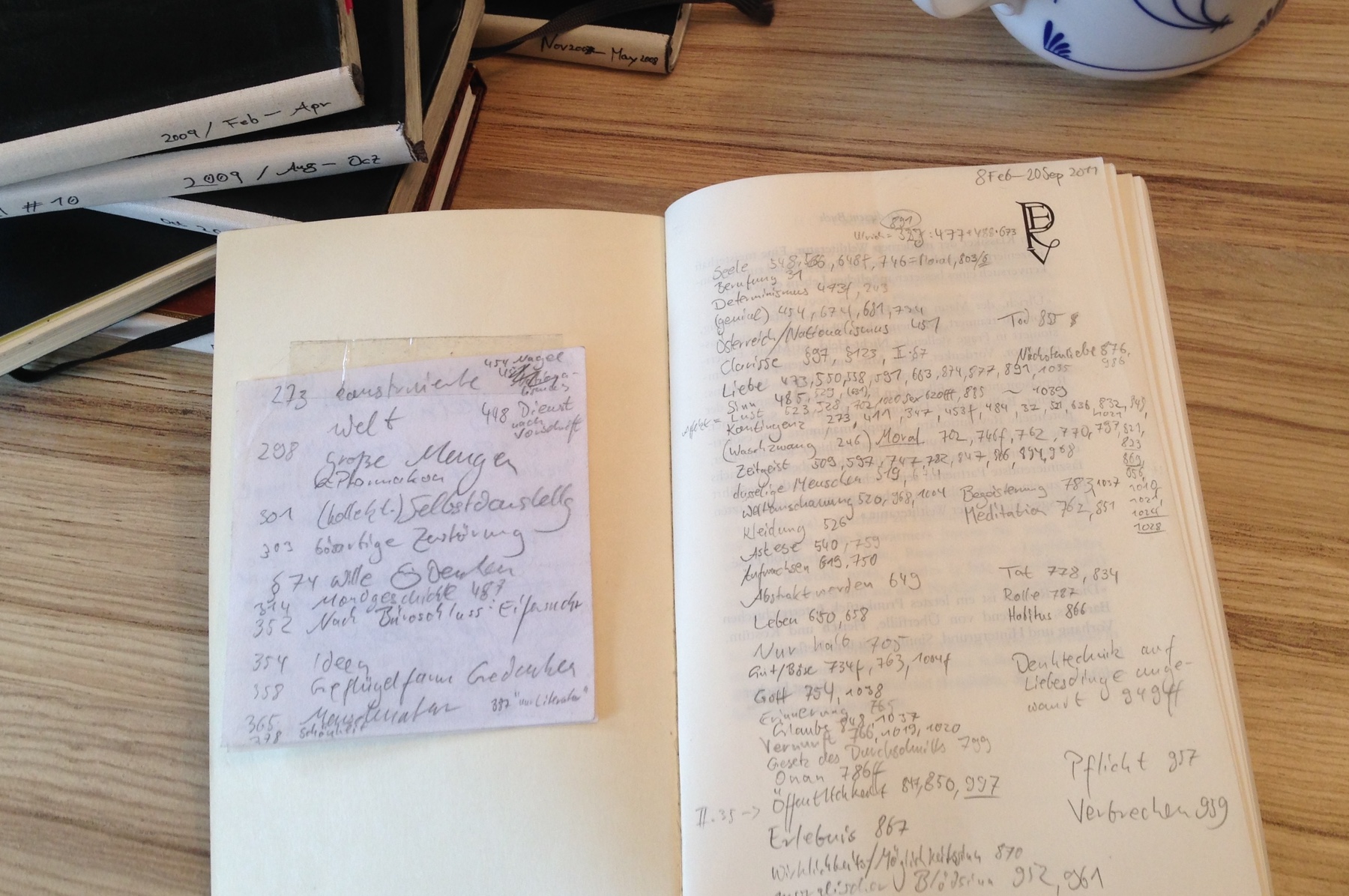Use Idea Indexes for Journals and Fiction
It’s nice to have an idea index in your book’s front pages. Revisiting a text you read years ago and finding an index in the front is a great feeling. Cal Newport recently blogged about idea indexes. I think they are very useful for fiction and personal journals.
Apart from a fondness for your own reminiscences, an idea index is not so useful if you want to work with book. The index may lure you into building up false confidence: creating an elaborate index is useful and rewarding work in itself, so you may end up taking few notes in the end.
Relying on the physical presence of the book is just another incarnation of Collector’s Fallacy.
Having said that, I think idea indexes have their place. I used them heavily in my early journals and when reading inspiring fiction.
If you haven’t tried idea indexes for yourself yet, I think you should give it a spin and share your results. Have a look at what I’ve found in my own library.
Idea Indexes in Journals

I love to write on paper, so I used to carry a Moleskine blank soft cover 1 pocket journal with me all day. I started to create a habit of journalling a few months into military service back in November 2007. During the time spanning Nov. 2007–Jan. 2010, I filled 11 note books with ideas, to-do lists, ramblings, diary entries, drawings, and worries.
Looking back, this is about the time I started to live consciously. I guess keeping a journal helped me “wake up” from some kind of teenage slumber.
It took 7 journals until I added an index in early 2009’s journal. There are prettier ones than mine for sure. There was enough inspiration on the internet to come up with adding both a table of contents and a list of dates to the first pages of each journal from there on.
Because the index sometimes became pretty cluttered, I moved the list of dates to the back in later journals and divided the index by topics.
If you’re into this, there’s a list of 100 Moleskine hacks which features a couple of tips on indexing (no. 22–27), too.
All in all, indexing your journal can be useful if you intend to delve in your past and see what you’ve felt years ago. I just stumbled upon notes on the Zettelkasten method which themselves aren’t part of the note archive, yet. Will fix that right after finishing this post.
Idea Indexes in Fiction
After journalling with indexes for a few years, I began to put an index into the front of a few books. These are still very dear to me. They resonate with me or changed the way I feel or think. They are transformational books I don’t want to miss.
One such book is Robert Musil’s The Man Without Qualities. I picked it because it has the longest index of all. I even pasted in two additional pieces of paper (on the left), filled with references on both sides:

I just love to re-visit The Man Without Qualities’s index and peek inside the book, selectively reading interesting passages. Some of the quotable passages are already in my Zettelkasten. A lot still isn’t. It’s just too much to be worth the effort.
Apart from a few self-help books, I mainly used idea indexes for fiction in the past. Ever since I discovered the use of a Zettelkasten I favor taking notes. Non-fiction is about passing ideas around anyway, so I aim to extract as much as possible. Seldom do I intent to read non-fiction books a second time, except for a couple of classics of philosophy perhaps.
Most fiction books I remember come with maybe a handful interesting passages. I don’t sweat taking notes as early as possible because there won’t be many anyway. I read fiction books during my commute or in bed, so I resort to annotating the text and taking note of the page on a piece of paper serving as bookmark. Later I extract my thoughts into the note archive.
Very deep and touching literature is rare, though. For these I still add idea indexes. I love to share these gems with friends, too. And when they ask what on earth happened to the front pages of the books, I encourage them to use the index to see whether they agree with my selection and what they think is more important instead.
Now that we speak of it, here’s a short list of books which were truly transformational for me and which I recommend to you:
- Everything by Hermann Hesse, especially Narcissus and Goldmund
- Works of Max Frisch, especially I’m not Stiller
- Robert Musil’s books, like the aforementioned The Man Without Qualities
- Momo by Michael Ende
- Irvin D. Yalom’s When Nietzsche Wept
I uploaded pictures of these books’ idea indexes to Flickr if you’re curious.
- Share your indexes: You are invited to join the Flickr group “Idea Indexes” and put up shots of your idea indexes, too!
- What books were transformational to you?
- Where have you used idea indexes in the past?
-
Affiliate link; we get a small kickback from the vendor if you buy from this link but it won’t cost you anything. ↩